5 Simple Tips for Using Pee Pads for Cats at Home
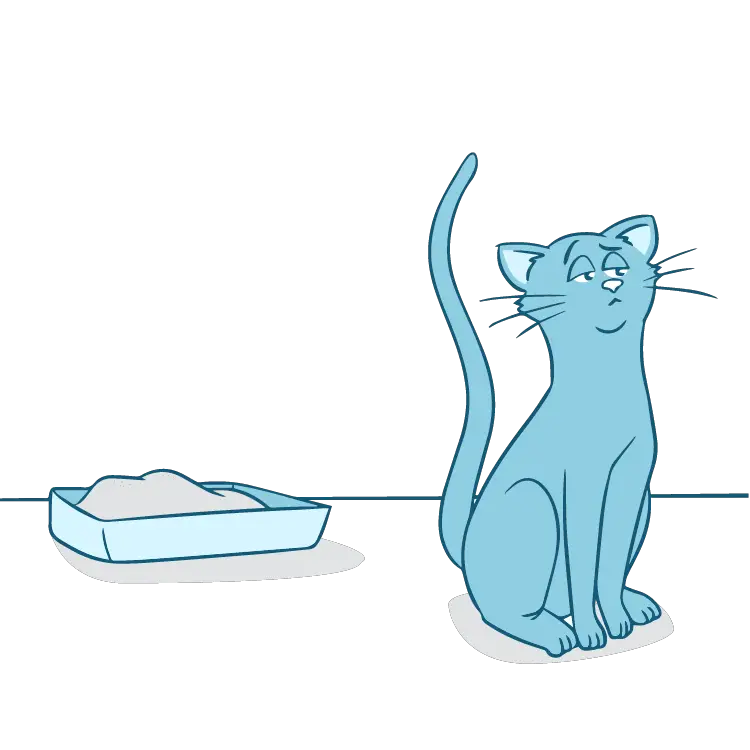
You understood that correctly, indeed…
Pee pads for cats really are a thing.
Well, they’re pretty much the same as puppy pads. But you wouldn’t call them puppy pads for cats, now would you.
“Why is my cat peeing on everything but the litter box?!!”
If you’re lucky, you’re never going to wonder that ever as a cat owner.
Unfortunately, a lot of cat owners do.
Cats are normally very particular about keeping themselves clean – almost to a fault.
But that doesn’t mean your cat will bother keeping your house clean.
Of course not.
Especially not when the reason why your cat is peeing on the floor is a medical problem, or a behavioral one.
Possible Reasons Why Your Cat is Peeing All Over the House
Before getting into the best ways to use cat training pads, you should know why your cat may need them.
A common mistake many owners make when their cat is peeing in the house – and not in the litter box – is to assume it’s a behavioral problem.
That’s jumping the gun, a little bit, don’t you think?
It may not be her fault at all!
That’s jumping the gun, a little bit. It may not be her fault at all!
Your cat may be avoiding the litter box for a variety of reasons, ranging from:
- Medical: illnesses such as Urinary Tract Infections (UTI), crystals or stones and intestinal cystitis do affect a cat’s ability to control her bladder.
- Stress: Is there a new pet or guest at home? Or is it an entirely new home? A strange animal outside? Stress can be caused by a variety of reasons, differing from cat to cat.
- Behavioral: Although this is often directly linked to stress, but behavioral problems can occur naturally. Especially if you have two or more tom cats at home who must share territory and things.
- Old age: Incontinence in old age can get almost anyone, us people too, unfortunately. You can’t do much, except make things easier for her, say by using more accessible litter boxes along with cat potty pads.
Where Pee Pads for Cats Come in Handy – 5 Tips For Using Cat Pee Pads in Various Situations
If your cat’s situation falls under any of the above four situations, you might be having trouble fixing it.
…And wondering how often do cats pee anyway (2-4 times a day on average).
Why, you ask?
Well, training cats is not a very straightforward thing.
And that’s why having a stack of absorbent pee pads for cats in such times can be a major help.
For instance, training pads for cats help some to transition smoothly to the litter box they didn’t like days ago. Potty pads for cats who have trouble with their aim can be a blessing for owners.
And get this:
Cat wee wee pads are useful at any age – be it training your kitten, or easing things for your geriatric old tabby who has trouble getting into the litter box.
1. Use Pee Pads for Cats When Your Cat Refuses to Use the Litter Box
Don’t you hate it when your cat likes to pee on the floor or carpet?
Or he plain dislikes using the litter box?
Using pet pads for cats helps deal with cleaning and transitioning much better. It’s crucial to remove all scent and clean thoroughly at the place of the accident unless you’re fine with repeats.
Good pee pads for cats help with that with their high absorbency and odor fighting properties.
Make sure you have the right size and kind of litter box and litter – fluff such as perfumed litter or self-cleaning boxes are rarely helpful.
But that’s not all:
You can use the cat pee pad for helping your kitty transition from his spot on the floor to the litter box.
Once you know there’s nothing wrong with them, you can gradually move the cat pee pad from his preferred spot, inch by inch over days or weeks – don’t rush – to the litter box.
Dabbing the pad with a bit of his pee or stool should clue him into using the pad if he’s initially reluctant.
2. Using Pee Pads for Cats Who Like to Spray Everywhere to Mark Territory
You might be wondering:
Why do cats pee on things sometimes, and not on the floor?
The answer is quite straightforward:
It’s their way of marking territory and isn’t just restricted to tom cats.
And not just males…
Female cats may also engage in spraying if you own more than one cat and there’s competition at home (however needless) for food, spots or your affection.
In this cases, taping a cat pee pad to the wall where they normally tend to spray and mark can save you trouble a lot of (and stink).
3. Wee Wee Pads for Cats Who Tend to Miss the Litter Box
Many of you have been there…
Cleaning up the messes your silly little kitty makes even while she’s using the litter box.
You should keep checking if your cat litter box is big enough as she’s growing up. If it isn’t, she may well find it too tough, or impossible to relieve herself within its confines.
On the other hands, some cats tend to aim poorly or not at all – they just go wherever they find litter or dirt beneath their feet.
For such scoundrels, having a large size potty pad – or several small ones covering the area beyond the edges of the litter box where your cat tends to spill over is a helpful way to manage the mess.
…At least until you get a better box.
4. Pet Pee Pads for Cats Who Don’t Like to Use the Litter Box Too Much
Some cats are so finicky, they refuse to use an already soiled litter box.
Trust me, it can drive you nuts.
Especially if you’re running low on litter. Or simply don’t have enough time to change it 2-3 times a day.
For these little prudes, you can choose to have extra reliving spots with the help of cat wee wee pads.
Choose spots away from the general living area that your cat is comfortable relieving in for the pet pads. Problem solved!
5. Pee Pads for Cats Who are Too Old, Sick or Injured to Use the Litter Box
You might not have thought of this…
But pee pads for cats can be really helpful in one more, really important way:
If your cat is injured, sick, or even recovering from a surgery of some sort, using the litter box can be literally a pain for him.
For instance, declawing causes a lot of pain for cats, leaving their feet sensitive to the lightest touches for a good while after the procedure.
Not getting into the long-term harms and consequences of declawing, it makes life hard immediately after in any case. In such and other similar situations, including older cats, use cat pee pads as substitutes for the litter box.
They’re a sensible alternative, at least when you can’t possibly rush your kitty outside each time she has to go.
Also, pee pads for cats, being white or at least light in color, help spot anything strange about your cat’s pee or stool immediately.
Pee and stool are in many cases a good indicator of any sickness or internal injuries, so you can flag it to the vet ASAP.
And if you’re wondering which pee pads to get for your cat, or whether puppy pads are good enough for cats, you don’t have to look further. Bulldogology’s Premium Training Pads are good for puppies and cats interchangeably. These multi-layered pads with high absorbency and odor-blocking will do the job for your cat’s business just as well.
And while the adhesive sticky tapes may not hold in place if your cat has the tendency to bury her waste, using the pads in a container much like a litter box is an excellent safeguard against potential messes.
So give these a go as your cat training pads, and let us know what you think! And if you have any tips or suggestions of your own, do let us know in the comments section below!
Who says the Pee Pads are only for Dogs? This works great for Cats too!
We know that the process of housebreaking can be stressful for both of you and your furry friend. That’s why we designed the Bulldogology Premium Pet Training Pads to help pet owners like you potty train their pets without any hassle. It’s the best way to ensure that your pet is comfortable and squeaky clean…even when you’re not at home. Our Bulldogology Premium Pet Training Pads is the best choice!
Now with Bullsorbent Polymer Technology
- Absorbs and turns liquid into gel right away keeping your floors dry all day long.
- With sticky adhesive tapes to keep your pet from making a huge mess.
- With built-in attractant to help potty train your pet when you’re not around.
- Perfect for indoor and outdoor use, use it as food and water mats, for kennels, or even when traveling.
- Instantly eliminates the stinky smell to keep your home fresh and clean.

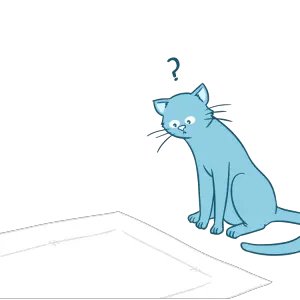
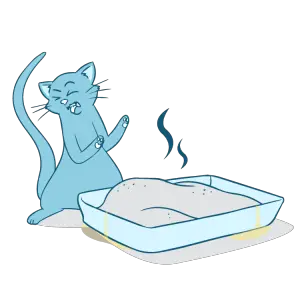
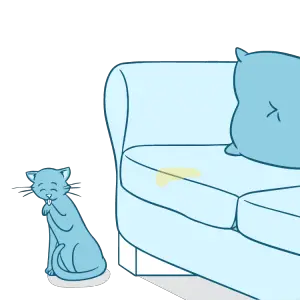
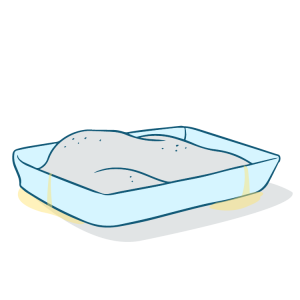
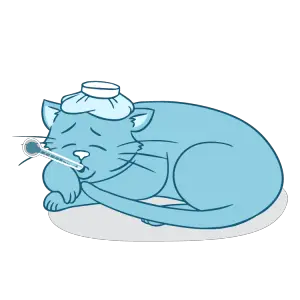
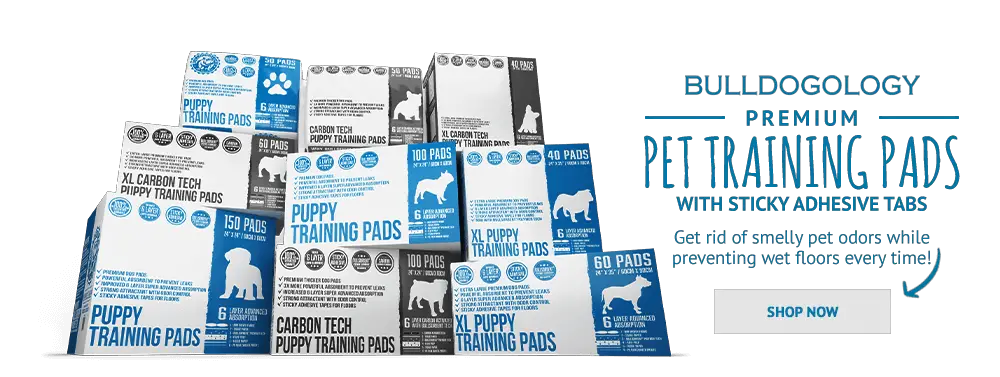
Been using puppy pads for 21 1/2 year old kitty in an empty litter box but it keeps getting on his feet!!! Then he gets on the couch or on me. :( don’t know what to try next!
Could you put a very small amount of litter in the box with the puppy pad so kitty’s feet might be kept dry?
We have two litters, one & a half & one year respectfully. They only recently started to pee all over the house. We have pads all over the place. Wherever they’ve soiled, we have put them down. We went through a pack of 75 in two weeks. One cat has a bladder infection & the vet has prescribed meds. It’s been only three days, so I hope it solves the problem. But, now, into of the females have started to pee on the pads I’ve laid down. We have four large litter boxes that I clean twice a day. My question…do they have to be totally washed occasionally? I’ve only been adding litter. Could this be the problem?
Hello,
I am sure you received an answer for this already, but just in case, yes! Any pee is like a type chemical/acid, it eats (if you will) at the plastic litter boxes and stains them with the smell. It is corrosive over time and that tends to embed the smell into the plastic, which is why it is important to clean the bin. If you think about it, it’s just like when a homeless individual urinates or a drunk individual on the sidewalk or buildings…it stinks and can stay there, just embedded into the materials, unless the city workers spray/wash down the sidewalk or buildings.
Hope this helps! ;)
Yes, you do need to change your litter. My cat started bleeding from urethra, and then she started peeing outside of her litter box. Finally, I realized the problem! I had not been changing her litter, just scooping it out. I’m sure that she was irritated from the ammonia that had built up in her cat box. Check your box of litter to see how often it needs to be totally changed out.
I use cat litter tray liners (Savic to match my Savic tray) and a long lasting cat litter(Intersand Classic Unscented) It is designed so that you clean the whole tray once a month. I clean with WeeAway(contains natural bacteria that break down the smell) Then put in a liner and fill the tray to 10cm depth. It clumps instantly and quickly allows removal of soiled litter whilst leaving all the clean behind. Just keep it topped up and deep and then at the end of the month dispose and start again. Recently to try and save money I have removed the clean litter and re-used it in the bottom of the new tray. My cat is an in/out cat but she has kidney issues and does BIG wees LOL
I use potty pads with the young kiddies. They are 8 weeks old now. I hope to try to move the pads closer to the litter box so they will use it. Smaller Kittie is so little, it’s hard for him to reach any litter box. I put the pads in a slate bathtub fir them, along with layer of newspapers. This kept down any accidents, and was easy to clean as well.
I have a 17 year old cat who sometimes misses getting her pee in the litterbox. I would like to use pads to catch the urine in the area outside the box where it tends to end up.
I have two questions:
1. What is the attractant that is used in the puppy pee pads? How does this attractant affect cats?
2. there are multiple products (with charcoal, without charcoal) – which is best for cats? How does one decide? I wish you would make a pee pad that was labeled as being specifically for cats.
I have two adult indoor cats who se their litter box faithfully. I am looking at getting a small puppy and would need to pee pad train for winter. My concern is will the cats use them. This is something I cannot abide
How is the owner supposed to know if your cats in particular will take to the pee pads? Honestly.
I have a fixed male cat that started spraying all over. Closet door….frig. Stove, TVStand, Book Cases, kitchen chairs , Kitchen counter,, Windows. I put doggie pee pads where he has sprayed. ugh…house looks terrible. I started taking them down a few at a time. He does good for awhile….then all of a sudden I find spray on one. Was wondering if he thinks it’s ok to spray on the pads cause they are there. He gets mad if we don’t let him outside when he wants. We have to alternate with a female cat he doesn’t like. She’s an outdoor cat and he is mean to her all of a sudden. We have been keeping her in the computer room this past winter. Let her in & out the window. A few times the door got left open when she was outside…hecwent in and sprayed all over. Today he tried to get in there and I chased him out…he ran into kitchen snd and sprayed all over a little bench the cats all lay on by window! I’m at Mt wits end with him. Tried the Felway plug-ins the calming collars…nothing works! What can I do????
It may be feline idiopathic cystitis, where stress causes the lining of the bladder to become inflamed, and they try peeing in many different places in search of comfort. It comes in cycles, happening for a few weeks until it passes (then restarts). Speak with your vet about anti-anxiety drugs (for the cat, of course). It made a world of difference in our family. Good luck.
I hope the spraying fixed male cat has gone to the vet as it sounds like a UTI. We had a boy kitty who started this – switched to wet food (eventually home made), added a dish of chicken broth (low salt) daily to improve liquid intake, multiple litter boxes – using storage boxes which were larger and deeper than traditional litter pans with very deep litter cleaned twice a day. UTI’s are terribly painful for a boy kitty.
What’s the best way to clean my cat of urine as I’ve been using wipes but he still smells of urine?
HI
‘I have a male cat who has a condition called pillow paw his paw pads a swollen. I tried all the litters my vet recomended such as Yesterdays News and Crystal litter he was going on the floor next to the box so I cleaned it up & bought pee pads I get the xxlarge or jumbo size holds 10 gallons of water put two out & that works for the 8hrws I’m at work so during the week they get changed twice a day more if needed & when I’m home he does the same thing as if it were liffer covers it up the poo smell is bad but it keeps the rug clean he took to it right off my otyher two use a box.